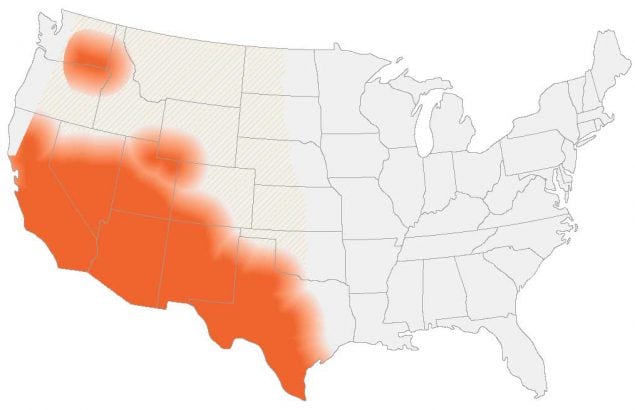Dr. Lisa Shubitz from the Valley Fever Center for Excellence at the University of Arizona is one of the lead veterinary research scientists on Valley Fever (coccidioidomycosis). Her recent research includes working on a vaccine to prevent valley fever in dogs, as well as improved mouse models of infection, studies on vaccine protection in immunodeficient mice, immunology studies in dogs with valley fever, and a study of fluconazole doses in alpacas.


Dr. Shubitz works alongside Dr. Hille our Coordinator of Valley Fever and Oncology, allowing us to offer more availability for advanced treatment options for caring for your pet with valley fever, including Abelcet treatment along with the use of Hyperbaric Oxygen Therapy. Please call us at 480-674-3200 to discuss appointment times and availability!
Valley Fever is very common in Arizona and the Southwestern United States.
Valley Fever in Animals
- Valley fever is caused by a fungus that lives in the desert soil in the southwestern United States
- Dogs comprise the majority of valley fever cases in animals
- Approximately 6-10% of dogs living in Pima, Pinal, and Maricopa counties in Arizona will become sick with Valley Fever each year.
- Not all dogs who breath in the spores will become sick
- About 70% of dogs who inhale Valley Fever spores are asymptomatic and possibly immune to the disease afterwards.
- As part of its life cycle, the fungus grows in the soil and dries turning into strands of cells that are inhaled.
- Once inhaled the spores grow and turn into endo spores. This process continues and spreads the infection in the host until the immune system surrounds and destroys it. The sickness Valley Fever occurs when the immune system does not kill the spores quick enough and they spread.
- There is no way to prevent valley fever
- You cannot prevent Valley Fever but you can limit the likelihood of exposure by avoiding activities that generate dust. Such as hiking, digging, sniffing.
- A vaccine is under development
- It is possible a vaccine will be available in the future to prevent Valley Fever or make it only a very mild illness.
Now that we know what Valley Fever is, how do we treat it?
Valley Fever diagnostics and treatment protocol
COCCI PROFILE (CBC, CHEMISTRY, T4, COCCI TITER): Based on presentation and clinical signs, radiographs, and CT may be indicated. However, bloodwork tends to be important in making the diagnosis. The Valley Fever Titer is not always positive.
TRIAL OF FLUCONAZOLE
A trial of fluconazole should be considered in symptomatic patients based off of blood work results. If a patient shows improvement during the trial of fluconazole, treat the patient as a Valley Fever patient regardless of titer results.
TREATMENT PLAN:
After 30 days of treatment blood work will be ran to look for changes in liver values and white blood cells. These values will help us determine the severity of the disease, future dosing, additional medications needed, and possible duration of treatment.
In 3-4 months, your doctor may perform a recheck of the blood work and Cocci (Valley Fever) titer. Blood work will be repeated to monitor values every 4-6 months moving forward. Valley Fever treatment can range anywhere from 6 months or longer. Treatment is discontinued when there are no changes in the titer (1:4 or below) for 2 consecutive blood tests in conjunction with a normal CBC and globulins or one or two years with no symptoms. Your doctor will recommend a recheck Cocci (Valley Fever) titer 3 months after discontinuing Fluconazole, to make sure that it is not returning.
Valley Fever Treatment
Valley fever is a fungal infection that can affect the lungs, bones, brain, skin, and other internal organs. This disease usually takes at least 3 months to resolve and may require ongoing medications for life.
Make sure that your pet is eating and drinking during the treatment. Call for directions if his/her appetite is poor or if he/she seems to be losing weight. Recheck bloodwork for valley fever every 3 months until the titer is negative.
Valley fever treatment and diagnostic recommendations
- Anti-fungal therapies:
- Fluconazole- this is a commonly used anti-fungal medication used to help kill the fungus. This medication is typically given 2 times per day for at least 3 months. Occasionally different anti-fungal medications are used if fluconazole is not working, or if your pet is too sick for this medication. *approximately $40 – $230 for 1 month of treatment for a 50lb dog
- Itraconazole- this anti-fungal medication is often used when animals are not improving with fluconazole therapy. This medication is typically given once per day (some animals may need up to 2 times per day) for at least 3 months. Liver enzyme elevations may be more commonly observed with this medication. This medication is less absorbable in the gi tract and must be administered with a meal in capsule form. *approximately $52 – $520 for 1 month of treatment for a 50lb dog
- Voriconazole- this anti-fungal medication is often used when animals have not improved on fluconazole and itraconazole therapy. This medication has similar absorption and treatment effects as fluconazole, and has been observed to have greater potency in laboratory studies. This medication is typically given 2 times per day for at least 3 months. Medication should be given on an empty stomach, at least 1 hour before or after feeding. Should be avoided or used as a last resort in cats due to adverse effects. *approximately $150 – $1100 for 1 month of treatment for a 50lb dog
- The most common side effects from these oral anti-fungal medications include (but are not limited to): inappetence, vomiting/diarrhea, elevated liver enzymes, and birth defects in fetuses. Please call for instructions if inappetence or vomiting/diarrhea is noted within a few days of starting these medications. Bloodwork is rechecked during treatment to monitor liver enzymes and valley fever titer.
- Amphotericin b lipid-based formulation (abelcet, ambisome)- this is an anti-fungal medication that kills fungal infections. This treatment will not cure valley fever. It is believed to shorten the length of time that oral medications may be necessary long term. This medication must be administered intravenously in hospital and has the potential to cause kidney damage. Treatments are typically administered 2 times per week for a 3-8 week duration, with bloodwork monitoring weekly.
- Anti-inflammatory medications- rimadyl/carprofen or metacam is used to help with fever and reduce inflammation. This allows the anti-fungal medication to work more effectively. It is typically given for the first few weeks of treatment, but may be given for the entire treatment period.
- Hyperbaric oxygen therapy- this treatment is useful for a variety of conditions to stimulate the immune system. Animals are placed in a large chamber with 100% oxygen under pressures 1.5 to 3 times normal atmospheric pressure. These treatments can last from 1-2 hours and are given 1-3 times daily. The total number of treatments necessary can vary per specific disease or patient response.
- Give vitamin c: 200-250mg (grocery store for humans) twice a day. This helps stimulate the immune system, and helps with absorption of the fluconazole.
- Start missing link (Petsmart / Petco). This is an immune booster/vitamin supplement that appears to speed recovery from valley fever.
- Recheck valley fever titer every 3 months until the titer is negative.


